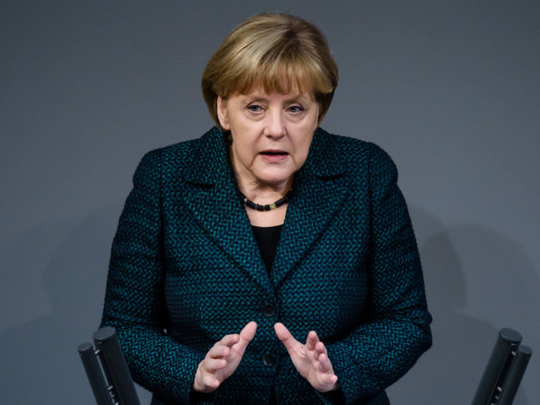
One thing we know for sure about German Chancellor Angela Merkel: She takes time to ponder her decisions and she weighs her words carefully. So the speech she delivered in Australia, a few days after Russian President Vladimir Putin stormed out of the G20, may go down as a major shift in European geopolitics. In a nutshell: Germany seems to be closing down Ostpolitik, the policy that has driven much of its diplomacy for decades. This has potentially huge repercussions that may shift the power games in Europe. Putin’s strong network of “Russland Versteher”, people who “understand” and side with Russia in Germany, will now be severely put to the test. Other European countries will be paying close attention to how this change in German-Russian relations unfolds. It is also a testimony to the importance of the German-US relationship, which the Obama administration is clearly relying on in its dealings with Russia’s revisionism of the post-Cold war order.
It is worth listening to Merkel’s Sydney speech. In a few swift sentences, she cast the Putin regime not just as a nuisance in a nasty regional rivalry, but as a threat to the very heart of European well-being.
First, she contemplated how European powers had stumbled into war in 1914, through “no readiness to accept compromises” and “an arrogant belief in military superiority”. It sounded like a description of Putin’s tactics in Ukraine. Then she referred to how the European project was built in the aftermath of the 20th century’s conflicts, leading to a union that has put its “faith in the cohesive effect of shared values”. But she warned: “There are still forces that believe in the supposed law of the strong and disregard the strength of the law.” Russia “regards one of its neighbours, Ukraine, as part of its sphere of influence,” said Merkel. All this “after the horrors of two World Wars”. She was indignant. The EU “will make every effort to reach a diplomatic solution” with sanctions against Russia “on the necessary scale and for as long as needed”.
So farewell, Ostpolitik? In 1969 the Social Democrat chancellor of Germany, Willy Brandt, had embarked on this course of dialogue with the Soviet Union and the East German Republic (DDR), in an attempt to break out of the legacy of the 1945 Yalta conference, which carved up Europe. This was Ostpolitik aimed at Wandel durch Annaherung (change through rapprochement); change in the east through diplomatic and economic contact. As a former major of Berlin, Brandt felt strongly about this. It is well-known that Merkel’s youth in East Germany has given her an acute awareness of the KGB world that Putin comes from. She strongly dislikes the Russian president, but this has never been about just personalities. She became chancellor in 2005 in the wake of Gerhard Schroder’s cosying up to Putin over the Iraq war and issues around Russian gas. Schroder, who went on to head one of Gazprom’s companies in Europe, celebrated his 70th birthday this year by inviting Putin to the party and giving him a big public hug shortly after Crimea was annexed. The Schroder years had brought Ostpolitik to a cynical climax.
Merkel is navigating a German-Russian relationship in which business weighs heavily. This is why her role in promoting sanctions has been essential in swaying Europe towards a more unified reaction to the Ukrainian crisis. Germany is Russia’s number one economic partner in Europe. Many expect Putin to describe any measure taken against Russia as submission to what he calls US “diktats”, well aware that the Snowden revelations have reignited anti-US sentiment in Germany. But if National Security Agency surveillance does touch a sensitive chord in German psychology, due to the memory of the Stasi and of the Nazi State, so do — for the same historical reasons — the outright lies of state propaganda, as demonstrated by Russia over Ukraine and the downing of the Malaysia Airlines plane. According to polls, more than 80 per cent of Germans feel that Russia cannot be trusted. Putin’s recent comments expressing an understanding for the Hitler-Stalin pact of 1939 did not go down too well either.
Germany’s turn against Putin’s Russia will come as a source of satisfaction in Poland and the Baltic states, as well as in Georgia, where fears of more Russian adventurism run high. A few years ago, Radek Sikorsky, then Poland’s foreign minister, gave a seminal speech in Berlin calling for more, not less, German engagement in Europe’s policies. The German president, Joachim Gauck, a former East German dissident, has made similar statements, pointing to Germany’s moral responsibility to take more than an economic approach to world problems. But people close to Gauck anticipate that Merkel’s new course will run into domestic obstacles — the Russland Versteher crowd being powerful. Equally, Italy’s industrial lobbies will be hard to convince. The central European countries are divided, with Hungary’s Viktor Orban and even some Czech officials playing to Putin’s tune. As for France, much will depend on how Francois Hollande manages the embarrassing Mistral warship sale to Russia.
Europe is faced with having to redefine its strategic approach to a large eastern neighbour that is economically fragile and swarming with militaristic nationalism. This is no meagre task. It will require finding a solution to Putin’s intention of dividing eastern Europe between the west and Russia. Merkel predicted in her speech that Putin’s strategy “will not prevail” but she warned “the road may be long, arduous and with many setbacks”.
— Guardian News & Media Ltd









